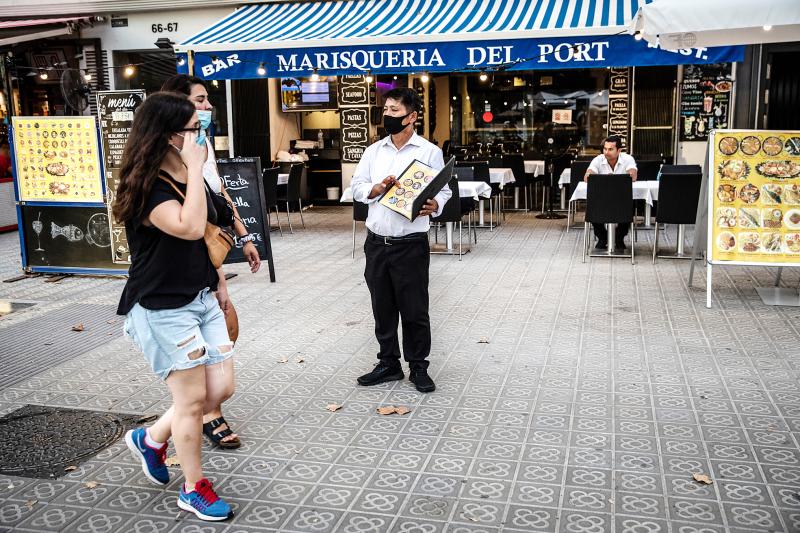The eurozone’s economic recovery from its deepest downturn on record has stuttered this month, particularly in services, as the pent-up demand unleashed last month by an easing of COVID-19 lockdowns dwindled, a survey showed yesterday.
To contain the spread of the virus, governments imposed strict lockdowns — forcing businesses to close and citizens to stay home, bringing economic activity to a near halt.
After many of those restrictions were relaxed, activity in the eurozone last month expanded at the fastest pace since the middle of 2018, but as infection rates have risen again in parts of the region, some earlier curbs have been reinstated.

Photo: Bloomberg
IHS Markit’s flash Composite Purchasing Managers’ Index, seen as a good gauge of economic health, sank to 51.6 from last month’s final reading of 54.9.
While still above the 50-mark separating growth from contraction, it was below all forecasts in a Reuters poll that had predicted no change from last month.
“The eurozone’s rebound lost momentum in August, highlighting the inherent demand weakness caused by the COVID-19 pandemic,” IHS Markit economics director Andrew Harker said. “The recovery was undermined by signs of rising virus cases in various parts of the euro area.”
An index measuring new business dropped to 51.4 from 52.7 and once again some of this month’s activity was derived by businesses completing backlogs of work.
Growth in the bloc’s dominant service sector stalled — its PMI plummeted to 50.1 from 54.7, below all forecasts in the Reuters poll that predicted a small dip to 54.5.
With demand waning, services firms cut headcount for a sixth month and more sharply than last month, with the employment index falling to 47.7 from 47.9.
Factory activity — which did not experience quite as sharp a decline as the service industry during the height of the pandemic — expanded for a second month.
The manufacturing PMI dipped to 51.7 from 51.8, confounding the Reuters poll forecast for a rise to 52.9.
An index measuring output, which feeds into the composite PMI, rose to 55.7 from 55.3.
Factory purchasing managers bought fewer raw materials, indicating that they do not expect a big pickup in activity.
The quantity of purchases index only rose to 49.6 from 48.3.
A full bounce back from the eurozone’s deepest recession on record would take two years or more, a Reuters poll of economists published on Thursday showed.
“The eurozone stands at a crossroads, with growth either set to pick back up in the coming months or continue to falter following the initial post-lockdown rebound,” Harker said.

UNCERTAINTY: Innolux activated a stringent supply chain management mechanism, as it did during the COVID-19 pandemic, to ensure optimal inventory levels for customers Flat-panel display makers AUO Corp (友達) and Innolux Corp (群創) yesterday said that about 12 to 20 percent of their display business is at risk of potential US tariffs and that they would relocate production or shipment destinations to mitigate the levies’ effects. US tariffs would have a direct impact of US$200 million on AUO’s revenue, company chairman Paul Peng (彭雙浪) told reporters on the sidelines of the Touch Taiwan trade show in Taipei yesterday. That would make up about 12 percent of the company’s overall revenue. To cope with the tariff uncertainty, AUO plans to allocate its production to manufacturing facilities in

Taiwan will prioritize the development of silicon photonics by taking advantage of its strength in the semiconductor industry to build another shield to protect the local economy, National Development Council (NDC) Minister Paul Liu (劉鏡清) said yesterday. Speaking at a meeting of the legislature’s Economics Committee, Liu said Taiwan already has the artificial intelligence (AI) industry as a shield, after the semiconductor industry, to safeguard the country, and is looking at new unique fields to build more economic shields. While Taiwan will further strengthen its existing shields, over the longer term, the country is determined to focus on such potential segments as

TAKING STOCK: A Taiwanese cookware firm in Vietnam urged customers to assess inventory or place orders early so shipments can reach the US while tariffs are paused Taiwanese businesses in Vietnam are exploring alternatives after the White House imposed a 46 percent import duty on Vietnamese goods, following US President Donald Trump’s announcement of “reciprocal” tariffs on the US’ trading partners. Lo Shih-liang (羅世良), chairman of Brico Industry Co (裕茂工業), a Taiwanese company that manufactures cast iron cookware and stove components in Vietnam, said that more than 40 percent of his business was tied to the US market, describing the constant US policy shifts as an emotional roller coaster. “I work during the day and stay up all night watching the news. I’ve been following US news until 3am

COLLABORATION: Given Taiwan’s key position in global supply chains, the US firm is discussing strategies with local partners and clients to deal with global uncertainties Advanced Micro Devices Inc (AMD) yesterday said it is meeting with local ecosystem partners, including Taiwan Semiconductor Manufacturing Co (TSMC, 台積電), to discuss strategies, including long-term manufacturing, to navigate uncertainties such as US tariffs, as Taiwan occupies an important position in global supply chains. AMD chief executive officer Lisa Su (蘇姿丰) told reporters that Taiwan is an important part of the chip designer’s ecosystem and she is discussing with partners and customers in Taiwan to forge strong collaborations on different areas during this critical period. AMD has just become the first artificial-intelligence (AI) server chip customer of TSMC to utilize its advanced